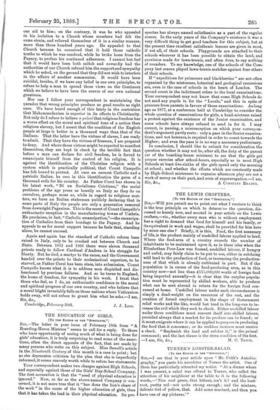THE LEWIS CROFTERS.
[TO THE EDITOS OF THE "SPECTATOR."]
SIR,—Will you permit me to point out what I venture to think is the true principle on which to determ'ne the question, dis- cussed so keenly now, and mooted in your article on the Lewis crofters,—viz., whether every man who is without employment has a right to demand that food for himself and his family, or its equivalent in work and wages, shall be provided for him here by some one else ? Briefly, it is this. Food, the first neeessary of life, is the product mainly of unskilled labour applied to land. Where the food-area of a country exceeds the number of inhabitants to be maintained upon it, as in these isles when the Elizabethan Poor-Law was framed, unskilled labour, if hungry and unfed, may fairly claim to be put to use, either in subduing wild land to the production of food, or increasing the productive- ness of that which is already cultivated in part. Bat if the population is in excess of the food-producing area, as in this country now—not less than 2115,000,000 worth of foreign food being imported annually—it is clear that the surplus popula- tion must be represented by skilled workers, able to produce what can be sent abroad in return for the foreign food con- sumed at home. Unskilled labour under such circumstances is simply a dead-weight on the resources of the rest, and the creation of forced employment in the shape of Government relief works and the like, would but tend in the long-run to in- crease the evil which they seek to check. Either unskilled labour under these conditions must convert itself into skilled labour, provided always that a market for its produce can be found ; or it must emigrate where it can be applied to purpose in producing the food that it consumes ; or its reckless increase must receive a check. "Replenish the land and subdue it," is the primal command; and the last clause is the stern condition of the first.






































 Previous page
Previous page